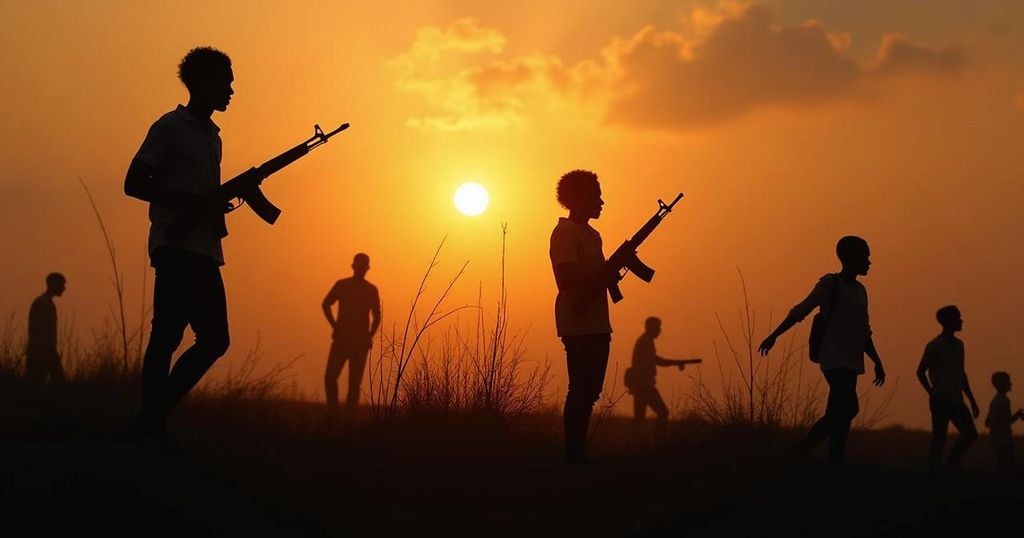Global Humanitarian Crises: The Overlooked Suffering in Sudan, Haiti, and Myanmar
This article highlights the ongoing humanitarian crises in Sudan, Haiti, and Myanmar, which are receiving little media attention amid current global conflicts. In Sudan, civil war and famine prevail with severe humanitarian consequences; Haiti grapples with gang violence and acute food insecurity; and Myanmar continues to suffer widespread repression under military rule. Each situation delineates significant human rights violations and urgent needs for international intervention.
This week’s media coverage has predominantly centered on the escalating conflict in the Middle East, diverting attention from enduring humanitarian crises in places like Sudan, Haiti, and Myanmar. Despite the ongoing turmoil, these regions persist in suffering from severe civil unrest, food insecurity, and human rights abuses, prompting urgent calls for international support and awareness. In Sudan, civil war and famine have escalated, with the United Nations reporting alarming human rights violations amidst fierce confrontations between the Sudanese Armed Forces (S.A.F.) and the Rapid Support Forces (R.S.F.) in greater Khartoum. U.N. expert Radhouane Nouicer emphasized the pressing need for the protection of civilians, highlighting the tragic resurgence of hostilities and the dire humanitarian crisis resulting in a staggering displacement of over 10 million individuals. Recent health concerns have surged as a cholera outbreak claims over 500 lives, symptomatic of the deteriorating conditions in a country now deemed to be facing one of the world’s most severe humanitarian crises. Meanwhile, in Haiti, the humanitarian situation remains critical, marked by rampant gang violence that controls 80% of the capital, Port-au-Prince. Internally, over 700,000 people have been displaced, with 48% of the population facing acute food insecurity. The International Organization for Migration has underscored the urgent need for sustained international assistance amid an economy spiraling toward a prolonged depression, exacerbated by inflation that has rendered food prices nearly unaffordable for many residents. Finally, Myanmar continues to grapple with the aftermath of military rule, which has resulted in significant civilian casualties and widespread displacement. The U.N. reports thousands have been killed, with an alarming spike in detentions leading to human rights abuses including torture and other forms of violence against detainees. As the military continues to face fierce resistance from various ethnic militias, the population struggles under the weight of economic turmoil, with half living below the poverty line. Recent governmental offers for dialogue with opposition groups have been met with skepticism, as the National Unity Government and affiliated factions maintain their commitment to restoring democratic governance. These ongoing crises illustrate a profound global suffering that receives inadequate attention from mainstream narratives. With urgent needs for humanitarian aid and intervention more pronounced than ever, the international community is called to acknowledge these situations and mobilize support effectively.
The backdrop of this article revolves around the increasingly volatile situations in Sudan, Haiti, and Myanmar, which have largely been overshadowed by current focus areas such as the Middle East. All three regions experience deep-seated crises characterized by armed conflicts, significant displacement, and humanitarian disasters. In Sudan, the civil conflict has led to alarming levels of violence against civilians, with extensive reports of human rights violations. Haiti faces a relentless humanitarian crisis exacerbated by gang violence and food insecurity, while Myanmar’s military rule has generated a climate of fear, repression, and economic hardship. Understanding these crises is vital to grasp the scale of suffering and the urgent need for international intervention and public awareness.
The situations in Sudan, Haiti, and Myanmar reflect severe humanitarian crises, each requiring immediate global attention and intervention. The staggering casualties, displacement, and violations of human rights across these regions underscore a critical need for international support and informed engagement. As the world’s gaze remains fixated on other conflicts, it is imperative that the plight of these nations is recognized and addressed, not only to alleviate their suffering but also to promote global stability and justice.
Original Source: www.americamagazine.org




Post Comment